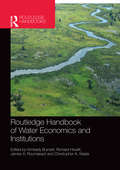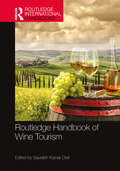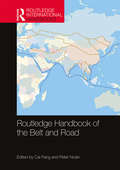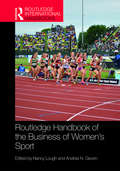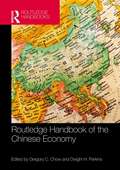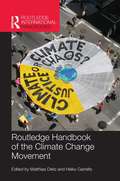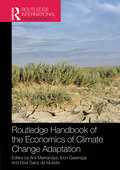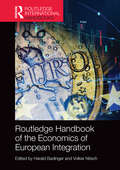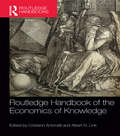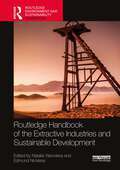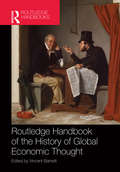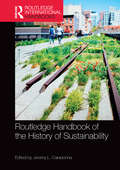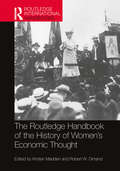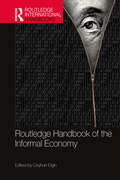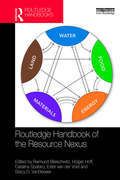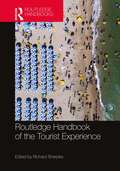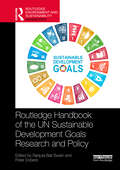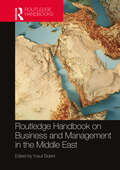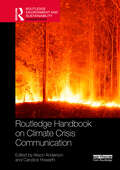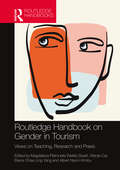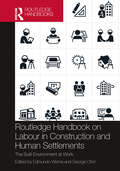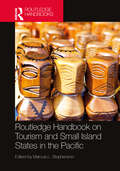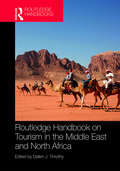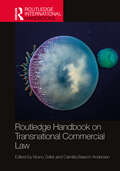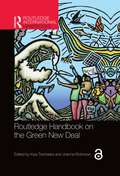- Table View
- List View
Routledge Handbook of Water Economics and Institutions (Routledge Environment and Sustainability Handbooks)
by Richard Howitt Kimberly Burnett James A. Roumasset Christopher A. WadaGrowing scarcity of freshwater worldwide brings to light the need for sound water resource modeling and policy analysis. While a solid foundation has been established for many specific water management problems, combining those methods and principles in a unified framework remains an ongoing challenge. This Handbook aims to expand the scope of efficient water use to include allocation of sources and quantities across uses and time, as well as integrating demand-management with supply-side substitutes. Socially efficient water use does not generally coincide with private decisions in the real world, however. Examples of mechanisms designed to incentivize efficient behavior are drawn from agricultural water use, municipal water regulation, and externalities linked to water resources. Water management is further complicated when information is costly and/or imperfect. Standard optimization frameworks are extended to allow for coordination costs, games and cooperation, and risk allocation. When operating efficiently, water markets are often viewed as a desirable means of allocation because a market price incentivizes users to move resources from low to high value activities. However, early attempts at water trading have run into many obstacles. Case studies from the United States, Australia, Europe, and Canada highlight the successes and remaining challenges of establishing efficient water markets.
Routledge Handbook of Wine Tourism
by Saurabh Kumar DixitWine tourism or enotourism or oenotourism or winery tourism or vinitourism is a special interest tourism that empowers local culture and spawns business opportunities for the local community. The comprehensive Routledge Handbook of Wine Tourism offers a thorough inquiry into both regular and emerging issues of wine tourism. Modern wine tourism extends beyond the mere cultivation of grapes and the production and selling of wine. The Routledge Handbook of Wine Tourism examines the complex interplay of market profiling, sustainable regional development, and innovative experiential marketing constructs which, when successful, contribute to the growth and sustainable evolution of global wine tourism. This handbook examines how the success of various enotourism events such as vineyard visits, winery tours, wine festivals and wine trails can stimulate the development of wine-producing regions and territories. Incorporating the latest philosophies and research themes, this handbook will be an essential reference for students, researchers, academics and industry practitioners of hospitality and tourism, gastronomy, management, marketing, cultural studies, development studies, international business and for encouraging dialogue across disciplinary boundaries.
Routledge Handbook of the Belt and Road (Routledge International Handbooks)
by Peter Nolan Cai FangChinese President Xi Jinping announced the Belt and Road Initiative (BRI) in 2013, a development strategy involving infrastructure development and investments in countries in Europe, Asia and Africa. It has rapidly turned into action, reflected in the establishment of a series of international cooperation mechanisms, landing of cooperation projects, and harvest of some early results. The influence is huge, and controversy is not unexpected. As one of the most frequently mentioned concepts in the official media, how does the “bid to enhance regional connectivity” construct a unified large market through cultural exchange and integration in practice? What is the status quo of building an innovative pattern with capital inflows, talent pool, and technology database? Routledge Handbook of the Belt and Road is an initial review of the theory and practice of BRI, and is the first handbook of its kind. Contributors are leading subject researchers, aiming to reflect the original intentions and principles, history and current situation, basic knowledge and latest studies. A total of 117 entries related to the BRI have been included, organised into 12 clear parts covering the following key topics: • China’s reform and opening-up and formation of the BRI• Backstory, concept and framework• The five roads and six economic corridors• Foreign affairs with Chinese characteristics• International action plans relevant and similar to the BRI• Case studies of the BRI implementation and promotion Routledge Handbook of the Belt and Road is an essential guide for researchers, practitioners and observers involved in the BRI construction. Global think tanks, media practitioners and universities will also find the book a useful reference.
Routledge Handbook of the Business of Women's Sport (Routledge International Handbooks)
by Nancy Lough Andrea N. GeurinCombining knowledge from sport management, marketing, media, leadership, governance, and consumer behavior in innovative ways, this book goes further than any other in surveying current theory and research on the business of women’s sport around the world, making it an unparalleled resource for all those who aspire to work in, or understand, women’s sport. Featuring international perspectives, with authors from North America, South America, Europe, Asia, and Oceania, and insightful, in-depth profiles of real leaders within different sectors of women's sport in the global sport industry, the Routledge Handbook of the Business of Women's Sport offers an integrated understanding of the ways traditional media and social media impact both the understanding and advancement of women’s sport properties, businesses, teams, and athletes. Innovative case studies show how societal issues such as gender, power, and framing impact the business of women’s sports and those who work in women’s sport. An essential reference for any researcher or advanced student with an interest in women’s sport or women in business, and useful supplementary reading for researchers and advanced students working in sport business, sport management, mainstream business and management, or women’s studies.
Routledge Handbook of the Chinese Economy
by Dwight H. Perkins Gregory C. ChowChina's rapid rise to become the world's second largest economy has resulted in an unprecedented impact on the global system and an urgent need to understand the more about the newest economic superpower. The Routledge Handbook of the Chinese Economy is an advanced-level reference guide which surveys the current economic situation in China and its integration into the global economy. An internationally renowned line-up of scholars contribute chapters on the key components of the contemporary economy and their historical foundations. Topics covered include: the history of the Chinese economy from ancient times onwards; economic growth and development; population, the labor market, income distribution, and poverty; legal, political, and financial institutions; and foreign trade and investments. Offering a cutting-edge overview of the Chinese economy, the Handbook is an invaluable resource for academics, researchers, economists, graduate, and undergraduate students studying this ever-evolving field.
Routledge Handbook of the Climate Change Movement (Routledge Environment and Sustainability Handbooks)
by Matthias Dietz Heiko GarreltsThis handbook provides a comprehensive overview of the growing transnational climate movement. A dual focus on climate politics and civil society provides a hitherto unavailable broad and systematic analysis of the current global movement, highlighting how its dynamic and diverse character can play an important role in environmental politics and climate protection. The range of contributors, from well-known academics to activist-scholars, look at climate movements in the developed and developing world, north and south, small and large, central and marginal. The movement is examined as a whole and as single actors, thereby capturing its scope, structure, development, activities and influence. The book thoroughly addresses theoretical approaches, from classic social movement theory to the influence of environmental justice frames, and follows this with a systematic focus on regions, specific NGOs and activists, cases and strategies, as well as relations with peripheral groups. In its breadth, balance and depth, this accessible volume offers a fresh and important take on the question of social mobilization around climate change, making it an essential text for advanced undergraduates, postgraduate students and researchers in the social sciences.
Routledge Handbook of the Economics of Climate Change Adaptation: Routledge Handbook Of The Economics Of Climate Change Adaptation (Routledge International Handbooks)
by Ibon Galarraga Anil Markandya Elisa Sainz de MurietaClimate change is one of the greatest challenges facing human kind owing to the great uncertainty regarding future impacts, which affect all regions and many ecosystems. Many publications deal with economic issues relating to mitigation policies, but the economics of adaptation to climate change has received comparatively little attention. However, this area is is critical and a central pillar of any adaptation strategy or plan and is the economic dimension, which therefore merits the increase in attention it is receiving. This book deals with the difficulties that face the economics of adaptation. Critical issues include: uncertainty; baselines; reversibility, flexibility and adaptive management; distributional impacts; discount rates and time horizons; mixing monetary and non-monetary evaluations and limits to the use of cost-benefit analysis; economy-wide impacts and cross-sectoral linkages. All of these are addressed in the book from the perspective of economics of adaptation. Other dimensions of adaptation are also included, such as the role of low- and middle-income countries, technology and the impacts of extreme events. This timely book will prove essential reading for international researchers and policy makers in the fields of natural resources, environmental economics and climate change.
Routledge Handbook of the Economics of European Integration (Routledge International Handbooks)
by Volker Nitsch Harald BadingerRoutledge Handbook of the Economics of European Integration provides readers with a brief but comprehensive overview of topics related to the process of European integration in the post-World War II period. Its short chapters reflect the most up-to-date and concise research, written by a collective of experts on their own subjects. The aim of this book is twofold. Firstly, the text illustrates the broad and diverse range of issues associated with European integration, and lastly, the key approaches and findings are summarised. Since institutional integration in Europe is an ongoing process, with possibly frequent and sometimes rapid changes, the chapters are intended to focus on the key features of the economic analyses of these topics. A wide and diverse set of economic issues is of direct relevance for European integration. These topics cover various fields, ranging from the history of the European Economic and Monetary Union, EU Trade Policy and the stability of international trade, single market issues over fiscal, monetary and other policies, the crisis that faces the Euro area, and institutions such as EU Council of Ministers. Not surprisingly, many of these issues have also been analysed from a European perspective. This handbook is designed to provide students, researchers, the public and policy makers with ready and accessible knowledge of issues related to European integration and will provide the definitive overview of research in the area.
Routledge Handbook of the Economics of Knowledge (Routledge International Handbooks)
by Albert N. Link Cristiano AntonelliThe Routledge Handbook of the Economics of Knowledge provides a comprehensive framework to integrate the advancements over the last 20 years in the analysis of technological knowledge as an economic good, and in the static and dynamic characteristics of its generation process. There is a growing consensus in the field of economics that knowledge, technological knowledge in particular, is one of the most relevant resources of wealth, yet it is one of the most difficult and complex activities to understand or even to conceptualize. The economics of knowledge is an emerging field that explores the generation, exploitation, and dissemination of technological knowledge. Technological knowledge cannot any longer be regarded as a homogenous good that stems from standardized generation processes. Quite the opposite, technological knowledge appears more and more to be a basket of heterogeneous items, resources, and even experiences. All of these sources, which are both internal and external to the firm, are complementary, as is the interplay between a bottom-up and top-down generation processes. In this context, the interactions between the public research system, private research laboratories, and various networks of learning processes, within and among firms, play a major role in the creation of technological knowledge. In this Handbook special attention is given to the relationship among technological knowledge and both upstream scientific knowledge and related downstream resources. By addressing the antecedents and consequences of technological knowledge from both an upstream and downstream perspective, this Handbook will become an indispensable tool for scholars and practitioners aiming to master the generation and the use of technological knowledge.
Routledge Handbook of the Extractive Industries and Sustainable Development (Routledge Environment and Sustainability Handbooks)
by Natalia YakovlevaThe Routledge Handbook of the Extractive Industries and Sustainable Development provides a cutting-edge, comprehensive overview of current trends, challenges and opportunities for metal and mineral production and use, in the context of climate change and the United Nations Sustainable Development Agenda 2030. Minerals and metals are used throughout the world in manufacturing, construction, infrastructure, production of electronics and consumer goods. Alongside this widespread use, extraction and processing of mineral resources take place in almost every nation at varying scales, both in developing countries and major developed nations. The chapters in this interdisciplinary handbook examine the international governance mechanisms regulating social, environmental and economic implications of mineral resource extraction and use. The original contributions, from a range of scholars, examine the relevance of the mining industry to the United Nations Sustainable Development Goals (SDGs), reviewing important themes such as local communities Indigenous peoples, gender equality and fair trade, showing how mining can influence global sustainable development. The chapters are organised into three sections: Global Trends in Mineral Resources Consumption and Production; Technology, Minerals and Sustainable Development; and Management of Social, Environmental and Economic Issues in the Mining Industry. This handbook will serve as an important resource for students and researchers of geology, geography, earth science, environmental studies, engineering, international development, sustainable development and business management, among others. It will also be of interest to professionals in governmental, international and non-governmental organisations that are working on issues of resource governance, environmental protection and social justice.
Routledge Handbook of the History of Global Economic Thought (Routledge International Handbooks)
by Vincent BarnettThe Routledge Handbook of the History of Global Economic Thought offers the first comprehensive overview of the long-run history of economic thought from a truly international perspective. Although globalization has facilitated the spread of ideas between nations, the history of economics has tended to be studied either thematically (by topic), in terms of different currents of thought, or individually (by economist). Work has been published in the past on the economic thought traditions of specific countries, but this pioneering volume is unique in offering a wide-ranging comparative account of the development of economic ideas and philosophies on the international stage. The volume brings together leading experts on the development of economic ideas from across the world in order to offer a truly international comparison of the economics within nation-states. Each author presents a long-term perspective on economics in their region, allowing global patterns in the progress of economic ideas over time to be identified. The specially commissioned chapters cover the vast sweep of the history of economics across five world regions, including Europe (England, Scotland, Ireland, Italy Greece, Spain, Portugal, Germany, Sweden, Russia and the Ukraine), the Americas (the USA, Canada, Mexico and Central America, Spanish-Speaking South America, Brazil and the Caribbean), the Middle East (Turkey, Israel, Arab-Islamic Economics, Persia/Iran, North Africa), Africa (West Africa, Southern Africa, Mozambique and Angola), and the Asia-Pacific Region (Australia and New Zealand, China, Southeast Asia, the Asian Tigers, India.) This rigorous, ambitious and highly scholarly volume will be of key interest to students, academics, policy professionals and to interested general readers across the globe.
Routledge Handbook of the History of Sustainability (Routledge Environment and Sustainability Handbooks)
by Jeremy L. CaradonnaThe Routledge Handbook of the History of Sustainability is a far-reaching survey of the deep and contemporary history of sustainability. This innovative resource will help to define the history of sustainability as an identifiable field. It provides a unique resource for advanced undergraduates, graduate students, and scholars, and delivers essential context for understanding the current state and future path of the sustainability movement. The history of sustainability is an increasingly important domain within the discipline of history, which draws on an interdisciplinary set of fields, ranging from energy studies, transportation, and urbanism to environmental history, economics, and philosophy. Key sections in this handbook cover the historiography of sustainability, resilience and collapse in historical societies, the deep roots of sustainability (seventeenth century to nineteenth century), the recent history of sustainability (twentieth century to present), and core issues and key debates in sustainability. This handbook is an invaluable research and teaching tool for those interested in the history and development of sustainability and an essential resource for the many sustainability studies programs that now exist in the world's universities.
Routledge Handbook of the History of Women’s Economic Thought (Routledge International Handbooks)
by Kirsten Madden Robert W DimandThe marginalization of women in economics has a history as long as the discipline itself. Throughout the history of economics, women contributed substantial novel ideas, methods of inquiry, and analytical insights, with much of this discounted, ignored, or shifted into alternative disciplines and writing outlets. This handbook presents new and much-needed analytical research of women’s contributions in the history of economic thought, focusing primarily on the period from the 1770s into the beginning of the 21st century. Chapters address the institutional, sociological and historical factors that have influenced women economists’ thinking, and explore women’s contributions to economic analysis, method, policies and debates. Coverage is international, moving beyond Europe and the US into the Arab world, China, India, Japan, Latin America, Russia and the Soviet Union, and sub-Saharan Africa. This new global perspective adds depth as well as scope to our understanding of women’s contribution to the history of economic thought. The book offers crucial new insights into previously underexplored work by women in the history of economic thought, and will prove to be a seminal volume with relevance beyond that field, into women’s studies, sociology, and history.
Routledge Handbook of the Informal Economy (Routledge International Handbooks)
by Ceyhun ElginDelve into the complex landscape of the informal economy with the Routledge Handbook of the Informal Economy, a groundbreaking volume that transcends conventional economic analysis by contextualizing it within a broader regulatory and social framework. This comprehensive handbook offers cutting-edge categorical, thematic, and regional analyses of the informal, or shadow, economy. An esteemed international ensemble of contributors draws on diverse economic perspectives, exploring a spectrum of definitions and measures, including household, firm-level, and employment-based metrics, alongside perceptional and model-based estimates. Employing a variety of econometric and methodological approaches, the volume provides both regional and global estimates of the informal economy's extent. Beyond conventional boundaries, it unveils various facets of informality, from child labor, tax evasion, and self-employment to precarious and undeclared work. In-depth examinations of the determinants and consequences of informality enhance the volume's robust analysis. As a forward-looking compendium, the handbook also offers insights into the future trajectory of the informal economy as we journey further into the 21st century. This definitive and up-to-date reference work is indispensable for readers in labor economics, development economics, political economy, policy studies, and sociology, offering a nuanced understanding of the multifaceted dimensions and dynamics of the informal economy.
Routledge Handbook of the Resource Nexus (Routledge Environment and Sustainability Handbooks)
by Holger Hoff Raimund Bleischwitz Catalina Spataru Stacy D. VanDeveer Ester Van Der VoetIn recent years the concept of the resource "nexus" has been both hotly debated and widely adopted in research and policy circles. It is a powerful new way to understand and better govern the myriad complex relationships between multiple resources, actors and their security concerns. Particular attention has been paid to water, energy and food interactions, but land and materials emerge as critical too. This comprehensive handbook presents a detailed review of current knowledge about resource nexus-related frameworks, methods and governance, including a broad set of inter-disciplinary perspectives. Written by an international group of scholars and practitioners, the volume focuses on rigorous research, including tools, methods and modelling approaches to analyse resource use patterns across societies and scales from a "nexus perspective". It also provides numerous examples from political economy to demonstrate how resource nexus frameworks can illuminate issues such as land grabs, mining, renewable energy and the growing importance of economies such as China, as well as to propose lessons and outlooks for sound governance. The volume seeks to serve as an essential reference text, source book and state-of-the-art, science-based assessment of this increasingly important topic – the resource nexus – and its utility in efforts to enhance sustainability of many kinds and implement the United Nations Sustainable Development Goals in an era of environmental and geopolitical change.
Routledge Handbook of the Tourist Experience
by Richard SharpleyRoutledge Handbook of the Tourist Experience offers a comprehensive synthesis of contemporary research on the tourist experience. It draws together multidisciplinary perspectives from leading tourism scholars to explore emergent tourist behaviours and motivations. This handbook provides up-to-date, critical discussions of established and emergent themes and issues related to the tourist experience from a primarily socio-cultural perspective. It opens with a detailed introduction which lays down the framework used to examine the dynamic parameters of the tourist experience. Organised into five thematic sections, chapters seek to build and enhance knowledge and understanding of the significance and meaning of diverse elements of the tourist experience. Section 1 conceptualises and understands the tourist experience through an exploration of conventional themes such as tourism as authentic and spiritual experience, as well as emerging themes such as tourism as an embodied experience. Section 2 investigates the new, developing tourist demands and motivations, and a growing interest in the travel career. Section 3 considers the significance, motives, practices and experiences of different types of tourists and their roles such as the tourist as photographer. Section 4 discusses the relevance of ‘place’ to the tourist experience by exploring the relationship between tourism and place. The last section, Section 5, scrutinises the role of the tourist in creating their experiences through themes such as ‘transformations in the tourist role’ from passive receiver of experiences to co-creator of experiences, and ‘external mediators in creating tourist experiences'. This handbook is the first to fill a notable gap in the tourism literature and collate within a single volume critical insights into the diverse elements of the tourist experience today. It will be of key interest to academics and students across the fields of tourism, hospitality management, geography, marketing and consumer behaviour.
Routledge Handbook of the UN Sustainable Development Goals Research and Policy (Routledge Environment and Sustainability Handbooks)
by Ranjula Bali Swain Peter DobersThis handbook brings together a collection of seminal research on the Sustainable Development Goals (SDGs) and investigates the effectiveness of the 17 goals for achieving transformative change toward sustainable development. As a collection of inter- and transdisciplinary research from around the world, this volume explores the applications, implications, and best practices of the goals at thematic, regional, and national levels, providing specific examples from a diverse range of places, such as Australia, Brazil, China, DRC, India, Italy, the Sahel region of Africa, and the USA, among others. The book serves as a mid-term evaluation of the SDGs, bringing to the fore comprehensive experiences and evidence related to the SDGs, whilst highlighting the interlinkages between the different goals. The handbook is divided into two parts: Part I brings together groundbreaking research to define, identify, and present conceptual frameworks for a sustainable future, whilst Part II focuses on the policies, practices, and implementation of the SDGs. The chapters identify key aspects missing from the 2030 Agenda, such as global power imbalances, cultural diversity, Indigenous rights, and unsustainable levels of consumption; they also critically evaluate the overall delivery and effectiveness of the SDGs whilst outlining potential future directions for the post-SDG 2030 Agenda. This handbook is aimed at a diverse and global audience of academics and students of economics, business studies, political science, and development studies. It will also serve as a valuable reference for leaders in the industry, the public sector, civil society, and international policymakers keen to gain a better understanding of the SDGs.
Routledge Handbook on Business and Management in the Middle East
by Yusuf SidaniThis Handbook provides thorough insights into crucial topics that have attracted scholarly and practitioner interest in business and management in the Middle Eastern region.The chapters of this Handbook open the window on the key areas of discussion in the field over the past few decades, including organizational behavior, leadership, business culture, business ethics, human resources, business strategy, entrepreneurship, finance, and accounting. It starts with identifying five key themes emerging from the variety of topics, locations, and questions addressed by the various authors who contributed to this volume. The remaining 30 chapters tackle various topics of interest to the research and the practitioner: institutional contexts for doing business in the region; issues of leadership, ethics, and organizational behavior; the role of women in leadership and some of the obstacles facing aspirant women leaders; people management and human resources issues in the Middle East; marketing in the Middle East; and strategy and entrepreneurship in the Middle East. The book closes with a reflection on management research in non-Western societies and describes some methodological challenges and propositions.The Handbook is designed for academics, students, and practitioners covering areas of relevance across business activities, functions, and locations in the Middle East. It is to be used as a reference for scholars doing business research or teaching and for practitioners involved in business activities in the region.
Routledge Handbook on Climate Crisis Communication (Routledge Environment and Sustainability Handbooks)
by Alison Anderson Candice HowarthThis Handbook provides a state-of-the-art review of leading research on climate change communication. As climate change has moved further up the political agenda, the challenge of how to communicate the scientific, social, and political aspects of the climate emergency is of increasing interest to researchers, NGOs, governments, and policymakers at national and international levels. The Routledge Handbook on Climate Crisis Communication provides a concise and expert summary of this growing field, explaining the theoretical, conceptual, and empirical developments that have been made in recent years and describing the origins and connections to broader topics, including risk perception; environmental journalism; social media; and climate justice and activism. With contributions from leading international scholars, the book is divided into seven key parts, besides the Introduction chapter:Part One: Conceptual ChallengesPart Two: Methodological ConsiderationsPart Three: Communicating Climate Science across CulturesPart Four: Journalism and News ReportagePart Five: Activism and Social MovementsPart Six: Audiences and Popular CulturePart Seven: Future DirectionsTaking stock of the current landscape of climate change communication and helping to shape the field of inquiry going forward, this is a go-to guide for established and newly interested researchers, government and policymaking bodies, and students and their instructors.
Routledge Handbook on Gender in Tourism: Views on Teaching, Research and Praxis
by Wenjie Cai Magdalena Petronella Swart Yang, Elaine Chiao Ling Albert Nsom KimbuThis comprehensive handbook delves into the multifaceted dimensions of the role of gender in tourism, spanning education, research, and practice. With 40 international contributions from leading thinkers in the field, this book brings together diverse themes such as entrepreneurship, mobility, sustainability, and sexuality. In doing so it shatters traditional boundaries and dissects how gender influences perceptions, experiences, and opportunities, advocating for equality and challenging entrenched power dynamics. Informed by the United Nation's Gender Equality goals, this handbook champions the potential of gender-aware tourism to reshape the world by fostering inclusivity, empowerment, and understanding. It adopts diverse insights, encompassing feminist and queer perspectives, challenging norms, and exploring marginalised voices. By dissecting gender in educational, entrepreneurial, and research contexts, it unveils hidden dynamics. This book empowers readers to grasp the breadth of gender's role and equips them with tools to foster equality and reshape the tourism landscape, while making suggestions for future research agendas.This book is intended for scholars, educators, researchers, government officials and practitioners in the fields of gender studies, tourism, education, entrepreneurship, employment, mobility, research, sustainability, and sexuality.
Routledge Handbook on Labour in Construction and Human Settlements: The Built Environment at Work
by Edmundo Werna George OforiRoutledge Handbook on Labour in Construction and Human Settlements presents a detailed and comprehensive examination of the relationship between labour and the built environment, and synergises these critical focus areas in innovative ways. This unrivalled edited collection of chapters analyses problems and presents possible solutions related to the employment and conditions of workers in the construction industry. It provides comprehensive coverage of the relationship between the global workforce and the built environment and is divided into four topical areas: how labour and the built environment relate to development; employment generation in the built environment; quality of employment in the built environment; and the impact of the built environment on labour in other sectors. Underpinning the entire book is the premise that the way the built environment is produced, and its main products – buildings, cities and towns – have an impact on large numbers of workers. At the same time, the quality of the built environment requires construction workers who are well trained and with good working conditions. While cities and towns are the engines of economic growth, they will not be able to fulfil their economic potential if poverty in the workforce is not addressed. Those who are unemployed, underemployed or work in unfavourable conditions cannot fully contribute to production, and at the same time are limited in their ability to purchase goods and services – therefore limiting economic growth and restricting improvements in their living standards. In addition, investments in infrastructure, housing and inner-city redevelopment cannot be sustainable if labour issues – i.e., poverty – are not addressed. This book aims at analysing this complex set of issues comprehensively and will be essential reading to a wide range of researchers across the interdisciplinary intersections of construction, business and management, economic development, urban studies, sociology, political science and project management.
Routledge Handbook on Tourism and Small Island States in the Pacific
by Marcus L. StephensonThis timely handbook critically examines the development and role of tourism in small Pacific Island states located across Melanesia, Micronesia and Polynesia. The volume presents an expansive evaluation of current issues, challenges and potentialities for the 13 self-governing states. Interdisciplinary in coverage and borne of a varied and international authorship, this handbook incorporates 27 specifically commissioned and original contributions. Structured into four thematic sections and embellished with insightful tables and illustrations throughout, the overarching ethos of this volume is to contribute to framing the role of tourism, tourism development and the tourism industry within the context of self-governing Pacific Island states faced with the challenge of pursuing an independent path of development. In doing so, the work highlights and deciphers various tourism development perplexities in the Pacific, examining closely the intersecting sociocultural, geopolitical, environmental, organizational, operational and strategic challenges. This volume, thus, discusses a range of issues: facilitators and inhibitors of tourism growth and development; climate change, ecological concerns, and eco-tourism; non-tourism and undertourism; crisis management and the COVID-19 virus; transportation and tourism infrastructural concerns; tourism policy and planning (including tourism governance); sectoral links between tourism; food and agriculture; gender and micro-entrepreneurship; community management and participation; cultural and natural heritage sites; and the handicraft industry. The work pays critical attention to the various trajectories of sustainable tourism and the United Nations Sustainable Development Goals. Despite the many challenges and concerns raised, the book implicates the importance of good governance, progressive post-COVID-19 recovery strategies and directives, and creative and imaginative options in the successful development, re-development and advancement of tourism. As a definitive reference resource for this subject area, this handbook will be of great interest to students, researchers and academics within tourism, development studies, geography, Pacific studies, sustainability and environmental studies.
Routledge Handbook on Tourism in the Middle East and North Africa
by Dallen J. TimothyThe Routledge Handbook on Tourism in the Middle East and North Africa examines the importance of tourism as a historical, economic, social, environmental, religious and political force in the Middle East and North Africa (MENA). It highlights the ecological and resource challenges related to water, desert environments, climate change and oil. It provides an in-depth analysis of the geopolitical conditions that have long determined the patterns of tourism demand and supply throughout the region and how these play out in the everyday lives of residents and destinations as they attempt to grow tourism or ignore it entirely. While cultural heritage remains the primary tourism asset for the region as a whole, many new types of tourisms are emerging, especially in the Arabian Gulf region, where hyper-development is closely associated with the increasingly prominent role of luxury real estate and shopping, retail, medical tourism, cruises and transit tourism. The growing phenomenon of an expatriate workforce, and how its segregation from the citizenry creates a dual socio-economic system in several countries, is unmatched by other regions of the world. Many indigenous people of MENA keep themselves apart from other dominant groups in the region, although these social boundaries are becoming increasingly blurred as tourism, being one socio-economic force for change, has inspired many nomadic peoples to settle into towns and villages and rely more on tourists for their livelihoods. All of these issues and more shape the foundations of this book. This Handbook is the first of its kind to examine tourism from a broad regional and inclusive perspective, surveying a broad range of social, cultural, heritage, ecological and political matters in a single volume. With a wide range of contributors, many of whom are natives of the Middle East and North Africa, this Handbook is a vital resource for students and scholars interested in Tourism, Middle East Studies and Geography.
Routledge Handbook on Transnational Commercial Law (Routledge International Handbooks)
by Bruno Zeller Camilla Baasch AndersenThis handbook, edited by Zeller and Andersen, is an indispensable contribution to the field of transnational commercial law. With an introduction by Sir Roy Goode, this book presents perspectives on legal issues of international sales transactions as perceived by world leading experts, exposing pragmatic and modern aspects of everything from drafting, to uniform laws to dispute resolution.The book divides itself between fundamental knowledge of transnational commercial law (e.g. chapters on forum shopping, CISG, Cape Town Convention, etc.) and current and topical developments (e.g. chapters on blockchain, smart contracts, metaverse, digital assets, etc.). International or transnational trade during the past 20 years has become more and more important, outstripping domestic trade as a hallmark of economic success. Model laws developed by the United Nations and other international bodies are now being transplanted or ratified by countries, so a translational element must always be considered as part of any choice of law.Addressing a global audience, as the instruments dealt with herein apply to many states in different regions, this handbook aims not only at an undergraduate and graduate student audience but also will interest professional lawyers.
Routledge Handbook on the Green New Deal (Routledge International Handbooks)
by Kyla Tienhaara Joanna RobinsonIn recent years, the Green New Deal has moved from relative obscurity to front and centre of policy discussions and public debates about how to respond to the climate crisis. It has been credited with radically changing the nature of the conversation on climate change and with re-energizing the environmental movement at a critical time. All Green New Deal proposals share an emphasis on the need for governments (rather than markets) to lead the energy transition. However, they differ in other respects. This Handbook analyses the fundamentals underlying all Green New Deals as well as exploring national and regional variations. It is divided into three parts. The first part examines the political economy of the Green New Deal focussing not just on how proposals will be costed but also on opportunities for a fundamental transformation of both national economies and the global economic system. The second part explores issues of justice, which are central to many Green New Deal proposals, including Indigenous rights, racial and gender equity, and justice for the Global South. In the third part, authors detail case studies of Green New Deal proposals and plans at the local, national, and regional level. This book will be an invaluable research and reference volume for students and scholars in economics, politics, sociology, geography, and environmental studies. It should also be of interest to those actively involved in climate and environmental policymaking.
